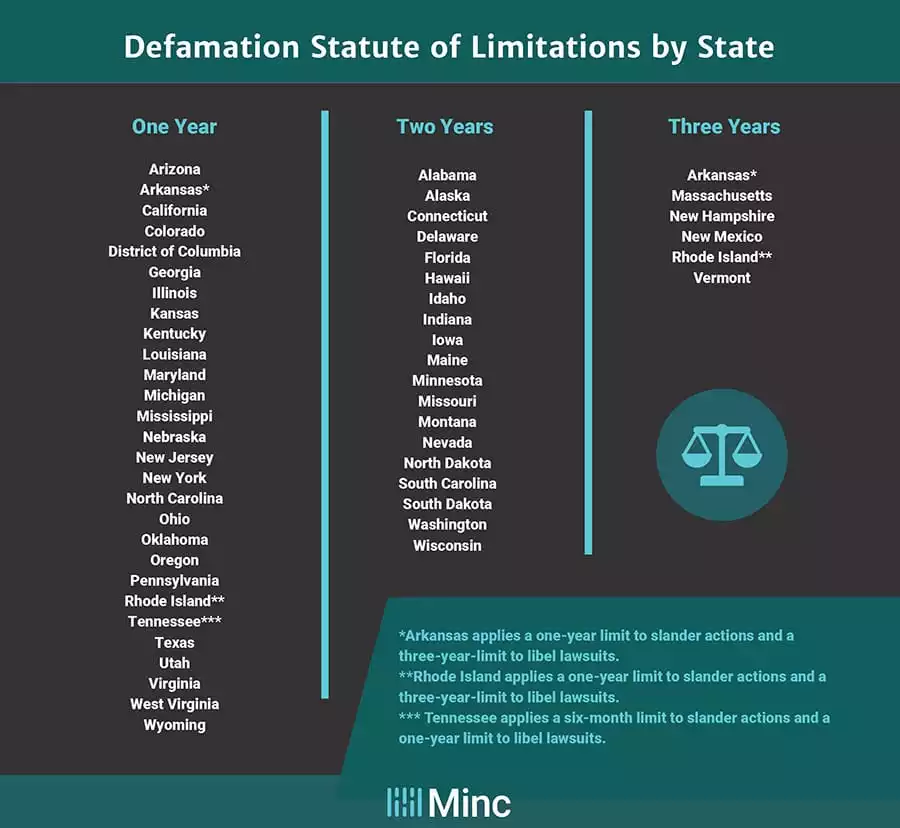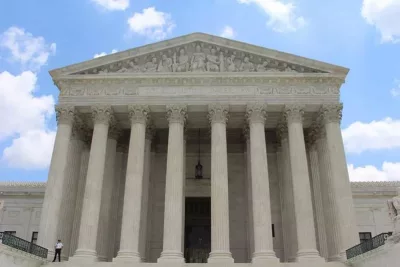
What is the Statute of Limitations for My Defamation Claim?
This page has been peer-reviewed, fact-checked, and edited by qualified attorneys to ensure substantive accuracy and coverage.
Have you been the victim of defamation and want to know the deadline to file a lawsuit? The statute of limitations is a major deadline that affects your ability to file a defamation lawsuit and is critical to keep in mind when considering all of your options in responding to defamation.
At Minc Law, we have filed hundreds of defamation lawsuits and represented thousands of clients across the globe, so we know exactly what you need to consider when pursuing a defamation claim. We have authored nearly two-dozen comprehensive state-specific defamation law guides and are well-versed in each state’s specific defamation statute of limitations and legal requirements. Including what to do if you believe you may have missed your deadline.
The statute of limitations for filing your defamation claim will depend on several key factors:
- The jurisdiction where you file your defamation lawsuit;
- Whether any legal exceptions apply to your defamation matter, such as John Doe claims, exigent circumstances, when you discovered the defamation, or if the victim is a minor; and
- Whether you have other potential legal claims (like business disparagement, harassment, or revenge porn).
In this post, we dive into:
- What the statute of limitations is,
- What the defamation statute of limitations is in your state,
- When and where you should file your defamation lawsuit,
- Major elements that determine your defamation case’s specific time frame, and the
- Statute of limitations for related internet claims.
Let us help. Contact us for a free consultation with an intake specialist to help you explore your removal options and craft an effective strategy.Are you the target of defamation?
What is a Statute of Limitations?
The “statute of limitations” is a time-limiting mechanism and the legal time frame for a plaintiff to file a lawsuit against a defendant. It was established to prevent plaintiffs from filing a lawsuit many years after an unlawful event occurred.
The statute of limitations exists to keep information that is material to the legal matter at hand and witnesses current. It also enables the accused party (the potential defendant) to receive proper notice of impending action, so that they can best prepare and defend themselves.
Since every state’s laws are different, there is not one uniform defamation statute of limitations across the United States. Even at the state level, other factors might affect your deadline to file a defamation suit – and there is usually more than one limitation period in play.
For a more in-depth look at what the statute of limitations is, how long you have to file your defamation claim, and the most common exceptions to the statute of limitations that can extend the limitations period, make sure to check out this video.
Video: What is the Statute of Limitations for Defamation in the U.S.?

The Single Publication Rule
Generally, the statute of limitations period begins the first time a defamatory statement is published or communicated. This is called the single publication rule.
Under the single publication rule, only the first publication of the defamatory statement is considered when it comes to determining the statute of limitations. This means that if a person published defamatory statements about you on various occasions, only the first instance matters for the date of the limitations period.
For example, say there was a libelous statement published in a magazine that sold hundreds of copies. For the purposes of the statute of limitations, there was a “single publication.” The statute of limitations clock started the first time the magazine sold, not when someone bought the last copy a few months later.
The single publication rule is very nuanced for defamation-related claims, and several exceptions and clarifications can apply. This rule is an example of why it is important to act as soon as you become aware of defamatory statements.
Where Should I File My Defamation Lawsuit?
The location of the case, or its jurisdiction, plays a major role in the applicable defamation statute of limitations and where you should file your defamation lawsuit.
Each state has a different defamation statute of limitations, which ranges from one to three years. Generally, most states try to limit their defamation statute of limitations to one year. They do this to make sure the relevant information is still available and witnesses can be deposed.
The chart below outlines the general statute of limitations for defamation claims in each state.

Most notably, Massachusetts, New Hampshire, New Mexico, and Vermont give the longest time frame at three years.
Even if you are located in a jurisdiction with a longer statute of limitations, it is still generally better to file your action sooner rather than later. After all, the more time that passes, the harder it is to pursue a defamation case – and it becomes more difficult for everyone involved.
For the plaintiff, it becomes increasingly difficult to gather the necessary evidence to back up your claims as time goes on. Many online platforms delete data after a certain length of time, so your chance of recovering evidence decreases with time. You may also need to find the perpetrator’s identity, which becomes more difficult as more time passes.
It may seem like determining the statute of limitations for defamation is a simple matter of looking up the state law. But often, there are claims other than defamation that come into play as well – and those can change the deadline to file your case.
Most people assume the place where the injury occurred determines the jurisdiction. Or else, it would be the location where the plaintiff or defendant lives. However, you might have several other options available to you.
Exploring All Potential Jurisdictions to File Your Defamation Claim
The fact that you live in a certain state does not guarantee that you must, or even can, file your defamation claim in that location. We can almost always make arguments for filing your defamation lawsuit in other jurisdictions.
For example, you could choose to file your lawsuit in the jurisdiction where you lost business. You might consider filing your case in the jurisdiction where your customers live. You may even be able to file your case in more than one state.
When Minc Law evaluates the proper jurisdiction for your claim, we always consider the statute of limitations in that jurisdiction. If there are issues with the statute of limitations, other jurisdictions can quickly become more favorable.
For example, you generally have one year to file your California defamation claim. According to Massachusetts defamation law, you have three years. All else being equal, we will likely opt for whichever jurisdiction has a longer statute of limitations for your case.
Common Exceptions to Statute of Limitations Deadlines
Sometimes, circumstances arise that make it necessary to extend the time frame to file a defamation claim. The statute of limitations will sometimes be paused (or “tolled”) because of a legal exception.
Below, we take a look at four common exceptions that could cause the statute of limitations to be tolled in your case.
Online Libel Tip: If you are the target of online defamation, sometimes the easiest first step is to send a defamation cease and desist letter to the offending party. Its a direct method to let the offending party know that you are not afraid to push back. However, sending a cease and desist letter to stop online defamation is not always the appropriate course of action and can backfire, so it is important to first consult an experienced defamation lawsuit attorney before sending one.
Anonymous Speech: Filing a John Doe Lawsuit
If the perpetrator behind the defamation is anonymous, in some states the statute of limitations against them will not begin until you discover who they are. This type of situation is commonly referred to as a John Doe claim because you initiate proceedings against a “John Doe” defendant before you ascertain their identity. The legal exception is called fraudulent concealment. We cover the process of filing a John Doe lawsuit further in the video below.
Video: How to Identify Internet Users Behind Anonymous Harassment & Defamation

When you file a John Doe lawsuit, the statute of limitations against the actual perpetrator will be tolled under this exception with the defendant has purposefully concealed their identity to avoid being caught for their wrongful conduct. Then, if you successfully identify the anonymous poster or person after the statute of limitations has passed, you can still add them to your complaint.
At that point, the statute of limitations clock would start running.
The Discovery Rule
Many states have a clarification on when the clock starts for the statute of limitations, called the discovery rule, which applies when the subject of defamation was unaware of the defamatory statement until some time after the fact.
In general, the discovery rule starts the statute of limitations clock on the date the victim learned of the damaging statement. This date could also be the point at which they should have discovered the defamation with reasonable diligence. This rule generally does not apply to online defamation. It generally does not apply to anything published that is publicly accessible and accessible to anyone, even if the Plaintiff does not actually find out about it till later.
The Victim Is a Minor
In certain jurisdictions where the victim is a minor, the statute of limitations clock may not begin to run until the victim turns 18.
This exception is also made for those who are declared legally incompetent at the time the statement was made.
Exigent Circumstances
Another common reason the statute of limitations will be tolled is for exigent circumstances. Anytime outside events make it impractical or impossible to file a complaint, the statute of limitations may be extended.
An excellent example of this exception is the COVID-19 pandemic when nearly every court was closed and complaints could not be promptly filed. In cases like this, reasonable exceptions are made for plaintiffs who file as soon as they are able.
When Should I File My Defamation Lawsuit?
Generally, the faster you can file your defamation claim, the better.
If you do not have to argue over the statute of limitations, it makes your defamation claim easier and allows for fewer distractions in your case. Being timely also helps with tracking down witnesses and evidence, and it is easier to keep them on hand. It is also easier to keep all non-online information available.
Filing your defamation lawsuit as soon as possible makes pursuing and bolstering your case easier.
Avoiding a statute of limitations fight also helps keep your bill down. Your attorneys will not have to argue over timeliness issues with the opposing side, and they will have more time to dedicate to the substantive matters in the civil procedure.
Filing a defamation lawsuit as soon as possible is also better for information retention and collection, especially if you are trying to identify anonymous internet users. Your goal is to keep all information as fresh as possible.
If you need data from either search engines or hosting providers, it is better to submit subpoenas as quickly as you are able, since internet platforms and service providers do not maintain data about someone’s identity indefinitely. You will want to obtain that data before it is deleted.
Statute of Limitations For Other Legal Claims
If you are the subject of defamation, you may also have experienced other targeted and malicious online behavior, such as internet harassment, cyberbullying, revenge porn, and business disparagement.
Each of these internet-related legal claims boasts their own statutes of limitations that could be more advantageous to pursue due to longer filing time frames.
Statute of Limitations For Online Harassment & Revenge Porn
Online harassment is extremely pervasive in modern times; according to a Pew Research study, 40 percent of adult internet users are harassed online. This behavior could constitute internet harassment or cyberbullying, and these charges often have a longer statute of limitations than defamation alone. A consultation with an experienced internet harassment lawyer is recommended for individuals attempting to determine their statute of limitations and claim’s validity.
You may be able to file a harassment claim up to five years after the incident of harassment, depending on if the offense was a misdemeanor or a felony.
Revenge porn usually has its own statutory section outlining the specific time frame to file a suit. Government agencies take the non-consensual distribution of nude or sexual images very seriously. This is especially true if the victim is a minor.
As of September 2020, 46 U.S. states and one territory have revenge porn laws codified in their books. Depending on the state, the charge could be a felony or a misdemeanor, and the statute of limitations is usually much longer than a defamation claim.
For example, California defamation law allows victims to file a lawsuit up to three years after they discover revenge porn. According to New York Defamation Law, a victim has three years from the publication of explicit photos (or one year from the date the victim discovers the publication) to file a lawsuit.
Although we help clients file lawsuits and sue for defamation in the state of New York, we may not always be a perfect match for every client and their unique circumstance. If for some reason you seek to sue for defamation and are looking for a New York defamation attorney, we recommend checking out our article on our Guide to Hiring the Top Defamation Lawyers in New York.
Defamation Removal Tip: You can keep track of your online reputation and the reputation of your business by creating a ‘Google Alerts’ account and monitoring your name and associated keywords online. This way, you can more easily identify any instances of online defamation as soon as they happen. The sooner you identify them, the sooner you can take action – and less damage to your reputation will occur.
Statute of Limitations For Business Claims
If false statements are published about your business, or related to a contract, it could have a longer statute of limitations than defamation alone. You may have a claim for business disparagement, or other similar claims, which covers derogatory comments made to discourage people from engaging with your business or property.
While defamation concerns itself with a person’s reputation, business disparagement is a legal claim that protects a business’s financial interests. Specifically, business disparagement concerns itself with a false statement that causes damage to a plaintiff’s property, business, or products.
Business disparagement is also known as:
- Commercial disparagement;
- Injurious falsehood;
- Trade libel;
- Slander of title or goods;
- Unfair competition;
- Tortious interference with prospective business advantage.
To succeed in a business disparagement claim, a plaintiff must prove that the defendant made a false statement(s) intending to cause financial loss for the victim’s business, and suffered financial losses as a result of that statement(s).
In a business disparagement suit, a plaintiff must also prove that the defendant acted with actual malice or reckless disregard (they knew what they were saying was not true or ignored its high probability of falsity) when publishing the false statements.
Business disparagement statute of limitations can be much longer than other tort claims, typically clocking in between two and three years.
For example, California law requires a plaintiff to file a business disparagement suit within two years of the publication of a disparaging statement(s), or within three years if the statement relates to the plaintiff’s title to property.
However, some jurisdictions have ruled that business disparagement claims are derivative of defamation claims and will apply a defamation statute of limitations on these claims.
Consult an Experienced Internet Defamation Attorney Before Filing a Defamation Lawsuit
The statute of limitations may seem like a hard and fast rule. But generally, there are different ways to present a claim that can circumvent certain statute of limitations issues.
★★★★★
“Minc Law and Dan Powell worked closely with us to get defamatory material removed from social media sites. We would not have been able to get this accomplished without them. They are true professionals, and have the resources and skills to guide clients through the process to a successful resolution.”
Jen Duncan, March 4, 2022
At Minc, we will provide a thorough analysis of your case to determine the best time to file your lawsuit. We will evaluate your case and the entirety of the circumstances to make sure we have considered all possible claims.
Also, we will still consider old claims that seem to be outside the statute of limitations. The fact that a defamation claim’s statute of limitations has passed does not mean there are no legal options.
It is our goal to determine the best possible course of action for you and to provide you the best possible outcome for your case.
Reach out today to schedule your free, initial no-obligation defamation consultation with an intake specialist by calling us at (216) 373-7706, speaking with a chat representative, or filling out our contact form.




